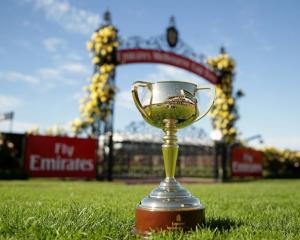Horse owners will soon get the opportunity to buy Vintage Crop.
However, it will not be the champion Irish stayer who made history in 1993 by becoming the first overseas horse to win the Melbourne Cup.
Instead, it is the standardbred version of Vintage Crop who will go under the hammer at next month's national yearling sales.
Similarly, thoroughbred racing fans can expect to see Lazarus at a galloping track near them soon.
Again, it will not be the champion pacer.
Instead this version lurks in a galloping stable somewhere in New Zealand or perhaps on one of the country's thoroughbred stud farms.
That is because the galloping version of Lazarus is yet to be named, but there is nothing to stop hundreds of owners with unnamed horses from using the champion pacer's name.
Keeper of the Stud Book and Registration Manager for New Zealand Thoroughbred Racing Julie Walker said her office had been anticipating the name would be applied for soon.
''We are waiting for a Lazarus to come in,'' she said.
The reason the name Lazarus can be used is because the thoroughbred and harness codes have no agreement to stop famous horses' names from being reused.
However, the issue, which raises the ire of breeders, owners and fans in both codes, could be simply fixed.
Both NZTR and Harness Racing New Zealand have confirmed they are open to the idea of standing down names of champion horses from the opposite code.
''If we were approached by harness racing to have a think about how we could do it, it is something that we would consider,'' Walker said.
''If we were going to change it would have in consultation with our stakeholders - our owners and breeders.''
HRNZ Registrar Mark Bennett acknowledged his code would be open to discussing the idea.
''We would be open to it. There is no guarantee anything would come of it because there are a lot of [issues] that you would have to nut out,'' he said.
The codes previously had an unwritten reciprocal arrangement but that had fallen apart over time, Bennett said.
The legality of restricting the names and defining which names were to be stood down and which were not were two of the biggest potential stumbling blocks to making a new agreement, he said.
Both codes use rules and the discretion of their staff to restrict horses having offensive or insensitive names.
In one case, not allowing the names Lip Up Fatty and Rotten Culture to be registered resulted in NZTR being taken to the High Court by Stirling Bloodstock Limited, although the case was dismissed.
NZTR is wary of the restrictions already placed on horse owners.
''We are a bit more aware that the names are out there on TV and the general public see them a bit more,'' Walker said.
''In the olden days we had names that were quite borderline. Nowadays, its just the way society is developing.''
Further restricting names, by excluding ones from the harness code could make naming horses even harder, Walker said.
Any issues stopping the protection of the names of champion horses or dogs have not stopped Australian racing codes from forming an agreement.
The codes have a formal arrangement to safeguard what are deemed ''recognised and preserved'' horse and dog names.











